Avoid being scammed by "Get the new iPhone 11 Pro"
Phishing/ScamAlso Known As: Get the new iPhone 11 Pro pop-up
Get free scan and check if your device is infected.
Remove it nowTo use full-featured product, you have to purchase a license for Combo Cleaner. Seven days free trial available. Combo Cleaner is owned and operated by RCS LT, the parent company of PCRisk.com.
What is "Get the new iPhone 11 Pro"?
"Get the new iPhone 11 Pro" is a scam run by deceptive web pages. The scheme claims that users can win an Apple iPhone 11 Pro for a small fee, however, this is an attempt to extort money from people and steal their personal information (e.g. credit card details).
Few visitors to deceptive websites, such as ones running "Get the new iPhone 11 Pro", access them intentionally - most people are redirected by intrusive advertisements or Potentially Unwanted Applications (PUAs) already infiltrated into the system.
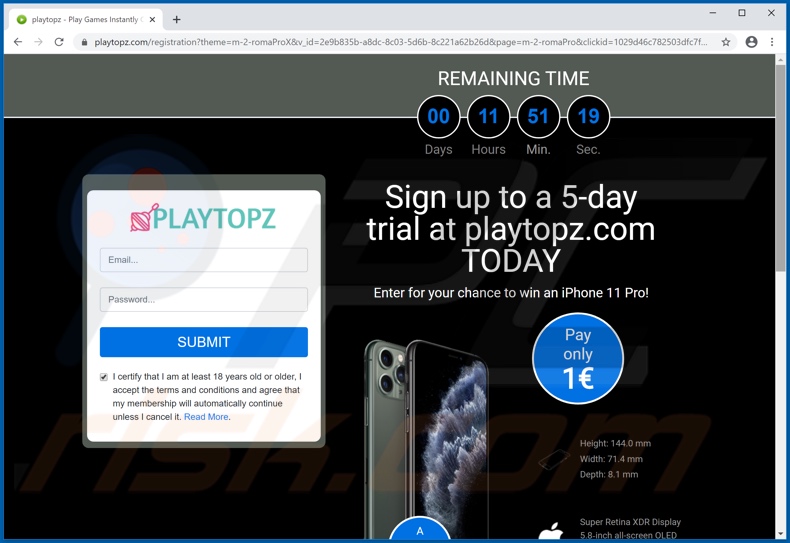
There are several variants of the "Get the new iPhone 11 Pro" scam. One version claims that for limited time only, visitors can sign-up for a five-day trial and have the chance to win an iPhone 11 Pro. To register/participate, users are informed that they must pay a small fee.
According to the web page, by registering, visitors confirm that they are eighteen or older and accept the terms and conditions, agree to the membership continuation until the point of cancellation (initiated by them). The text presented below the window, wherein users can enter their email and password, states that the selected winners are aware of the fact by email.
The bottom of the page contains details concerning why billing information is required, age limitation, fees/payment and support. While the scam reassures users that there are no hidden fees and their banking/credit card details will not be misused, there are no guarantees that this information is accurate.
Especially, since users agree to the "terms and conditions" by creating an account (which is a necessary step to take part in the fake prize giveaway). When an attempt is made to create an account, the site immediately requests that users pay the fee.
Another variant of "Get the new iPhone 11 Pro" claims that users can order the device for an extremely low cost, however, the small print at the top of the page states that this 'special offer' is delivered with a three-day trial to an affiliated subscription service, which has a monthly cost of 90 EU (amount/currency might differ depending on the user's geolocation).
This subscription can be cancelled within three days. If it is not, the service is renewed monthly until cancellation. This scam is designed solely to generate revenue for the designers at the expense of users.
By registering and paying the fee, users will not receive the promised Apple iPhone 11 Pro - instead they will experience financial loss, which can increase exponentially, if the scam site includes a monthly subscription.
You are strongly advised against trusting websites promoting "Get the new iPhone 11 Pro" and similar schemes, as doing so will lead to financial loss and can result in serious privacy issues.
As well as force-opening deceptive/scam web pages, PUAs can cause redirects to sale-oriented, untrustworthy/rogue, compromised and malicious pages. Unwanted applications may seem legitimate and are endorsed as "useful" and "free" software. In fact, they are often nonoperational and have dangerous capabilities.
Some PUAs can run intrusive ad campaigns. I.e., deliver harmful ads that diminish the browsing experience. Intrusive advertisements are dangerous, due to the dubious/malicious sites to which they redirect and for their capability to stealthily download/install unwanted content (e.g. PUAs).
Other unwanted apps can hijack browsers: limit/deny access to their settings and promote fake search engines. PUAs are commonly capable of tracking data. They monitor and record browsing-related information such as URLs visited, pages viewed, search queries typed, IP address, geolocations and other details.
This private data is then shared with third parties (potentially, cyber criminals) seeking to misuse it for financial gain.
To summarize, PUAs can cause browser/system infiltration and infections, lead to serious privacy issues, financial loss and even identity theft. To ensure device integrity and user safety, remove all suspect applications and browser extensions/plug-ins without delay.
| Name | Get the new iPhone 11 Pro pop-up |
| Threat Type | Phishing, Scam, Social Engineering, Fraud. |
| Fake Claim | Scam claims users can win iPhone 11 Pro. |
| Related Domains | playtopz[.]com; walemedia[.]com; rainfatstacks[.]com, todaysnewcustom[.]com, amazongiftcenter[.]vip and many others |
| Serving IP address | 104.18.142.98 (playtopz[.]com); 104.16.220.59 (walemedia[.]com); 104.27.147.5 (rainfatstacks[.]com) |
| Detection Names (playtopz[.]com) |
Comodo Valkyrie Verdict (Malicious), Full List Of Detections (VirusTotal) |
| Symptoms | Fake error messages, fake system warnings, pop-up errors, hoax computer scan. |
| Distribution methods | Compromised websites, rogue online pop-up ads, potentially unwanted applications. |
| Damage | Loss of sensitive private information, monetary loss, identity theft, possible malware infections. |
| Malware Removal (Windows) |
To eliminate possible malware infections, scan your computer with legitimate antivirus software. Our security researchers recommend using Combo Cleaner. Download Combo CleanerTo use full-featured product, you have to purchase a license for Combo Cleaner. 7 days free trial available. Combo Cleaner is owned and operated by RCS LT, the parent company of PCRisk.com. |
"Randomly selected to test the new iPhone", yourchances.net, and "SPECIAL AWARD FROM OUR SPONSORS" are examples of other scams. There are various scam models run by deceptive websites such as promises of 'amazing' prizes, 'unbelievable' offers, alerts that an essential piece of software is outdated/missing, warnings that the system is infected or at risk, and so on.
These schemes generate revenue by encouraging users into making monetary transactions (for fees, bills, fines, etc.), revealing personal information, downloading/installing/purchasing untrustworthy or malicious content, calling expensive fake technical support lines, to name just a few.
How did potentially unwanted applications install on my computer?
PUAs can be downloaded/installed with other programs. "Bundling" is the term used to describe this deceptive marketing method of packing regular products with unwanted or malicious software. Rushing download/install processes (e.g. ignoring terms, using pre-set options, skipping steps, etc.) endangers devices with potential infiltration and infections.
Some PUAs have "official" download web pages. When clicked, intrusive ads can execute scripts, designed to download/install PUAs without users' permission.
How to avoid installation of potentially unwanted applications
You are advised to research content, prior to downloading/installing. Use only official and verified download sources. Avoid Peer-to-Peer sharing networks (BitTorrent, eMule, Gnutella, etc.) and other third party downloaders as they are untrustworthy, and hence more likely to offer suspect and/or malicious programs.
Treat download and installation processes with caution. Read the terms, explore all available options, use the "Custom/Advanced" settings and decline offers to download/install supplementary apps, tools, functions and so on.
Intrusive ads tend to seem normal and harmless, however, they can redirect to highly dubious sites (e.g. adult-dating, pornography, gambling and others). If you encounter advertisements/redirects of this kind, check the system and remove all dubious applications and/or browser extensions/plug-ins immediately.
If your computer is already infected with PUAs, we recommend running a scan with Combo Cleaner Antivirus for Windows to automatically eliminate them.
Text presented in "Get the new iPhone 11 Pro" scam web page:
Sign up to a 5-day trial at playtopz.com TODAY
Enter for your chance to win an iPhone 11 Pro!Pay only
1€
Height: 144.0 mm
Width: 71.4 mm
Depth: 8.1 mm
Super Retina XDR Display
5.8‑inch all-screen OLED
Triple 12MP Ultra Wide, Wide and Telephoto CameraA
1159€
ValueEmail...
Password...
I certify that I am at least 18 years old or older, I accept the terms and conditions and agree that my membership will automatically continue unless I cancel it. Read More.
REMAINING TIME
00 Days 11 Hours 55 Min. 31
Among all participants we will select a winner who will win a new iPhone 11 Pro
Screenshot of the web page asking to provide details to pay the sign-up/participation fee:
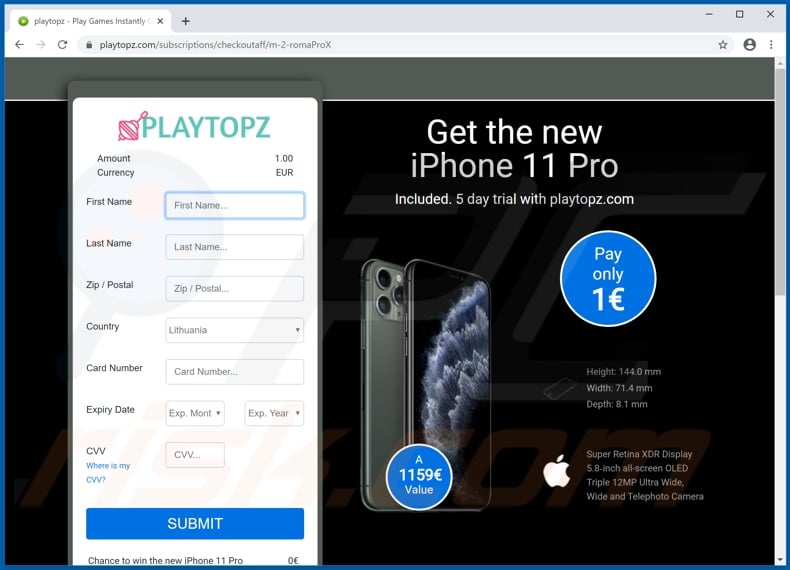
Text presented in this page:
Get the new
iPhone 11 Pro
Included. 5 day trial with playtopz[.]com
A
1159€
Value
Pay only
1€
Height: 144.0 mm
Width: 71.4 mm
Depth: 8.1 mmSuper Retina XDR Display
5.8‑inch all-screen OLED
Triple 12MP Ultra Wide, Wide and Telephoto CameraAmount 1.00
Currency EUR
Please enter your first name.
First Name
Last Name
Zip / Postal
Country
Card Number
Expiry Date
Where is my CVV?
CVV...
Chance to win the new iPhone 11 Pro 0€
5 day trial of playtopz.com. 1€
Total to pay 1€
The appearance of "Get the new iPhone 11 Pro" pop-up (GIF):
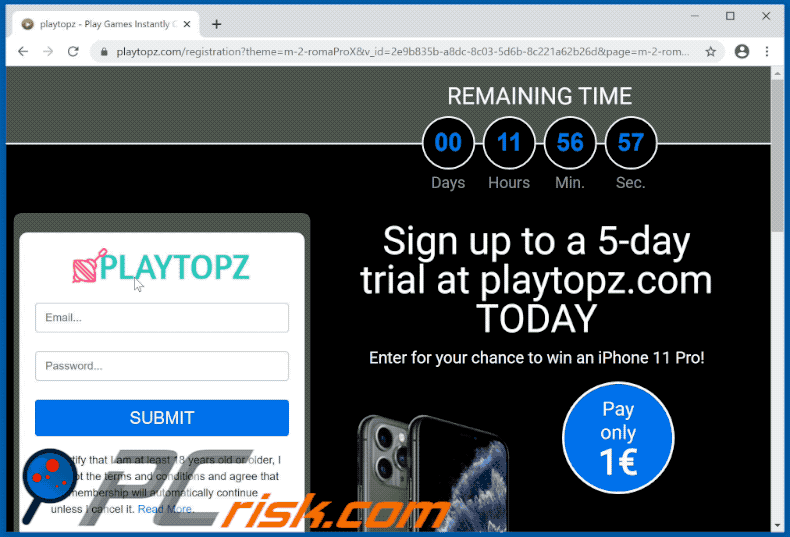
Another variant of "Get The New iPhone 11 Pro" pop-up scam:
Initial pop-up message:
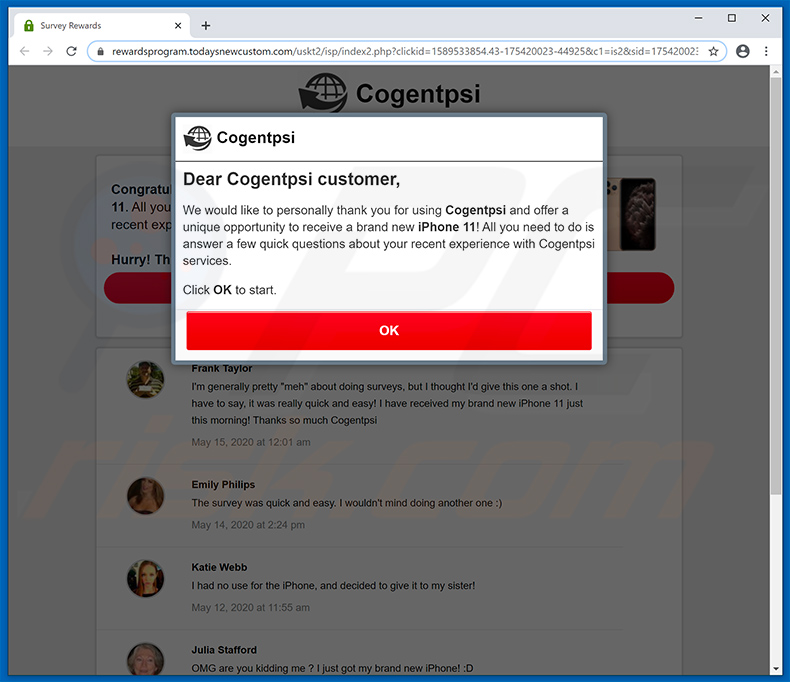
Text presented within:
Dear Cogentpsi customer,
We would like to personally thank you for using Cogentpsi and offer a unique opportunity to receive a brand new iPhone 11! All you need to do is answer a few quick questions about your recent experience with Cogentpsi services.Click OK to start.
Website background:
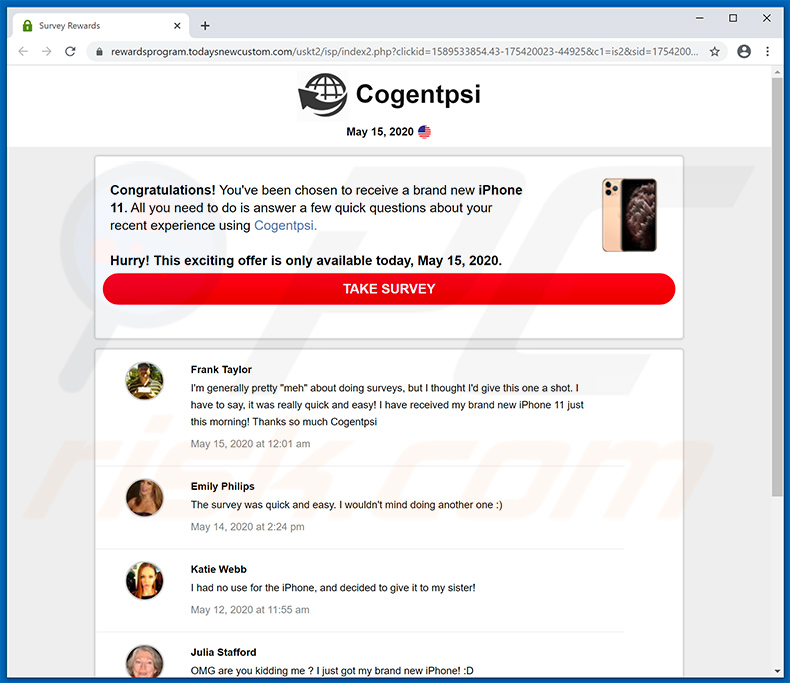
Text presented within:
Congratulations! You've been chosen to receive a brand new iPhone 11. All you need to do is answer a few quick questions about your recent experience using Cogentpsi.
THIS IS AN INDEPENDENT SURVEY. This website is not affiliated with or endorsed by and does not claim to represent or own any of the trademarks, trade names or rights associated with any of the products which are the property of their respective owners who do not own, endorse, or promote this website. *Trial products offered on the last page require shipping and handling fees. See manufacturer's site for details as terms vary with offers. See important terms and conditions regarding this survey, site and advertisement. Important: Shipping costs may apply
Phishing site that users get redirected to:
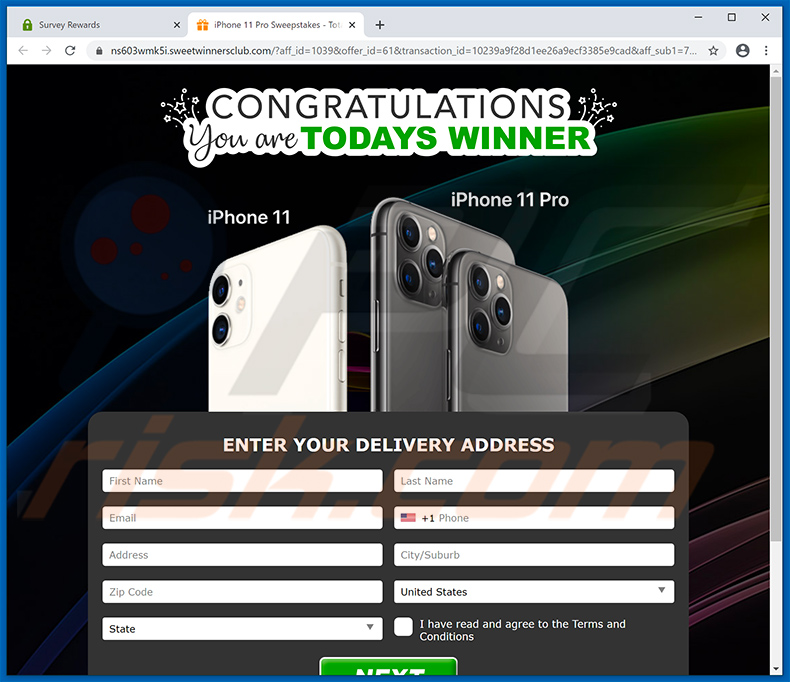
Appearance of this scam variant:
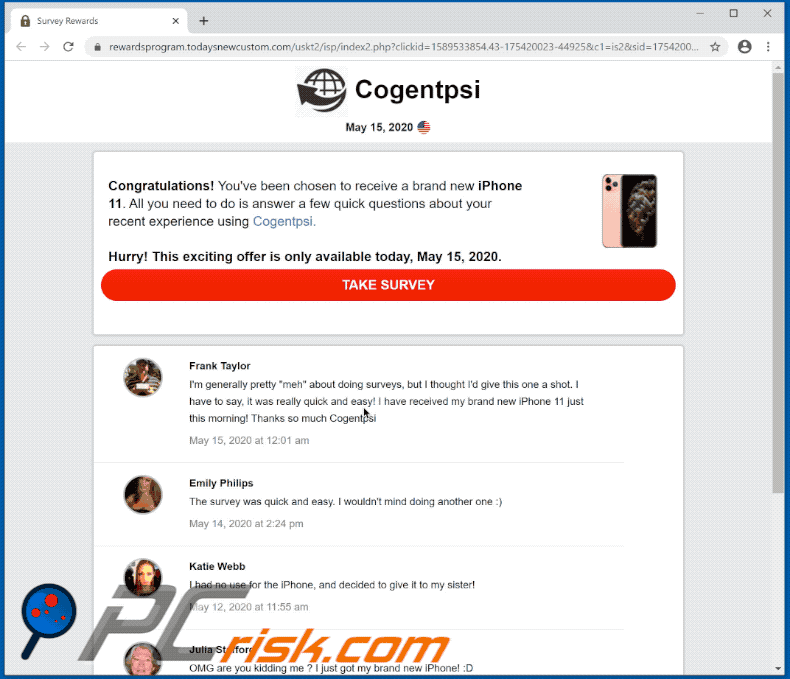
Screenshot of another variant of the "Get the new iPhone 11 Pro" scam:
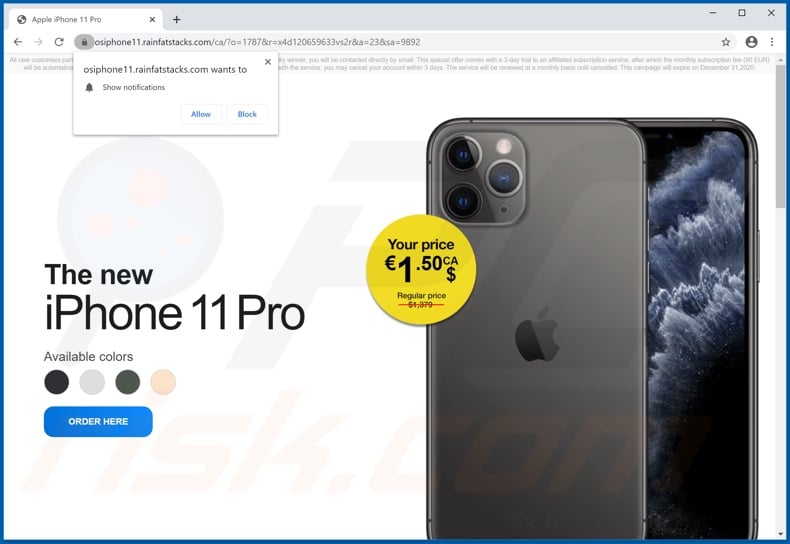
Yet another variant of "Get The New iPhone 11 Pro" pop-up scam:
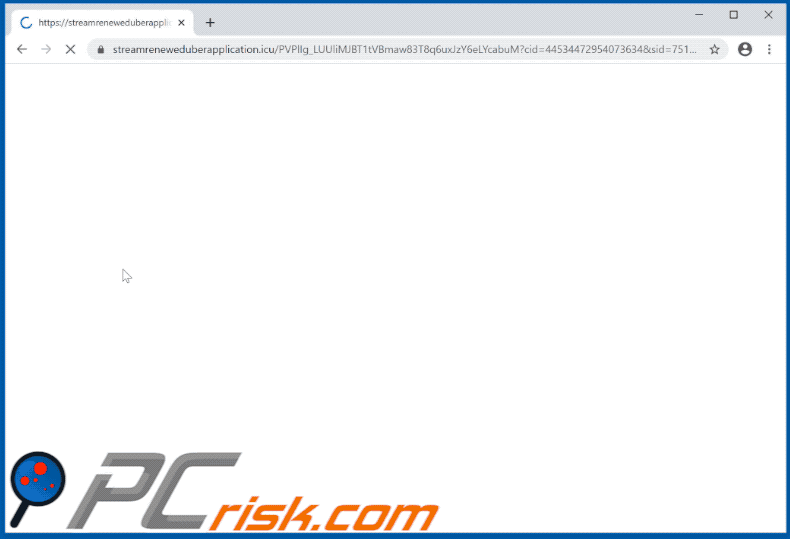
Yet another variant of "Get The New iPhone 11 Pro" pop-up scam:

IMPORTANT NOTE! These deceptive sites ask to enable web browser notifications.
Example of a browser notification promoting "Get The New iPhone 11 Pro" pop-up scam:
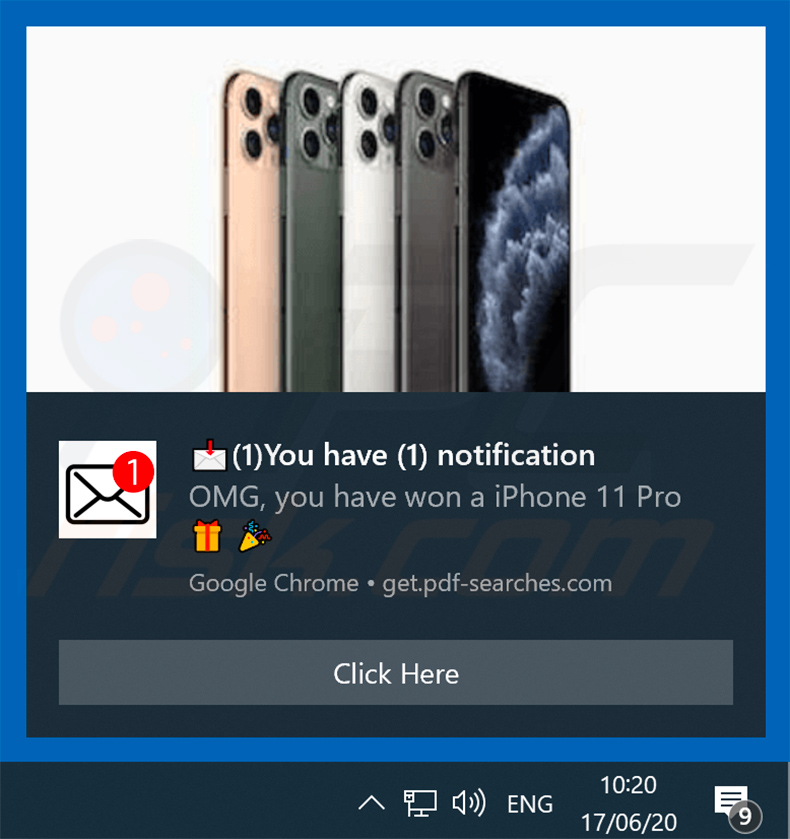
Therefore, before commencing, perform these steps:
Google Chrome (PC):
- Click the Menu button (three dots) on the right upper corner of the screen
- Select "Settings", scroll down to the bottom and click "Advanced"
- Scroll down to the "Privacy and security" section, select "Content settings" and then "Notifications"
- Click three dots on the right hand side of each suspicious URL and click "Block" or "Remove" (if you click "Remove" and visit the malicious site once more, it will ask to enable notifications again)
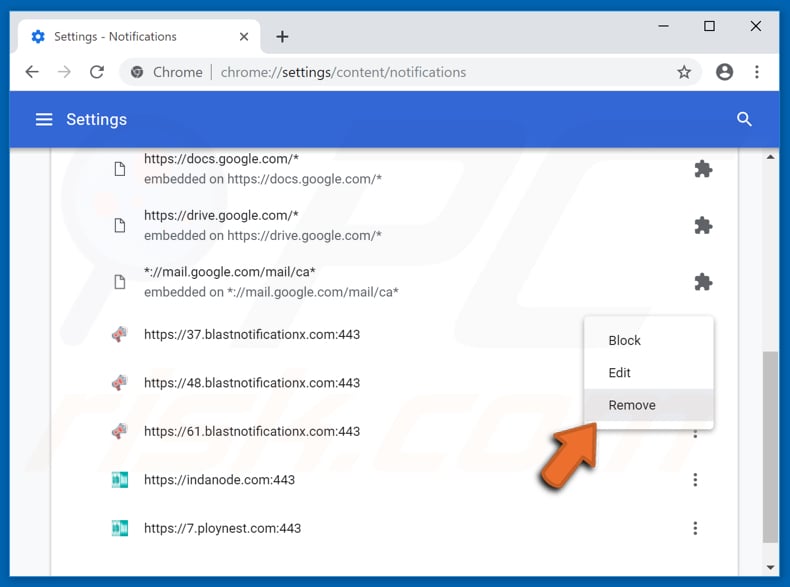
Google Chrome (Android):
- Click on the Menu button (three dots) on the right upper corner of the screen and click "Settings"
- Scroll down, click on "Site settings" and then "Notifications"
- In the opened window, locate all suspicious URLs and click on them one-by-one
- Select "Notifications" in the "Permissions" section and set the toggle button to "OFF"
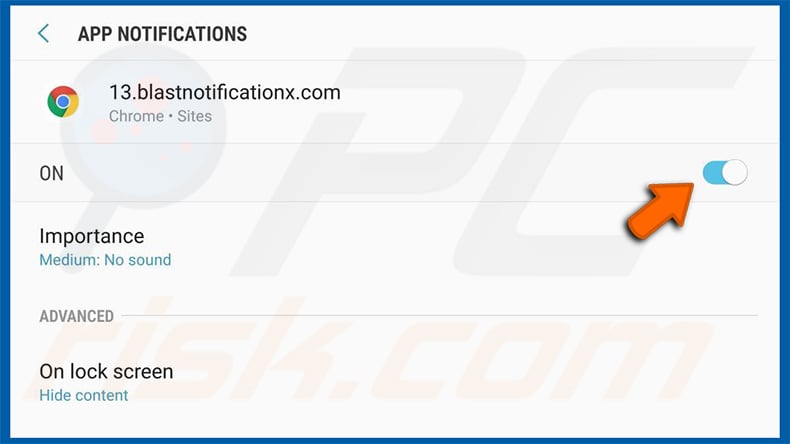
Mozilla Firefox:
- Click the Menu button (three bars) on the right upper corner of the screen
- Select "Options" and click on "Privacy & Security" in the toolbar on the left hand side of the screen
- Scroll down to the "Permissions" section and click the "Settings" button next to "Notifications"
- In the opened window, locate all suspicious URLs, click the drop-down menu and select "Block"
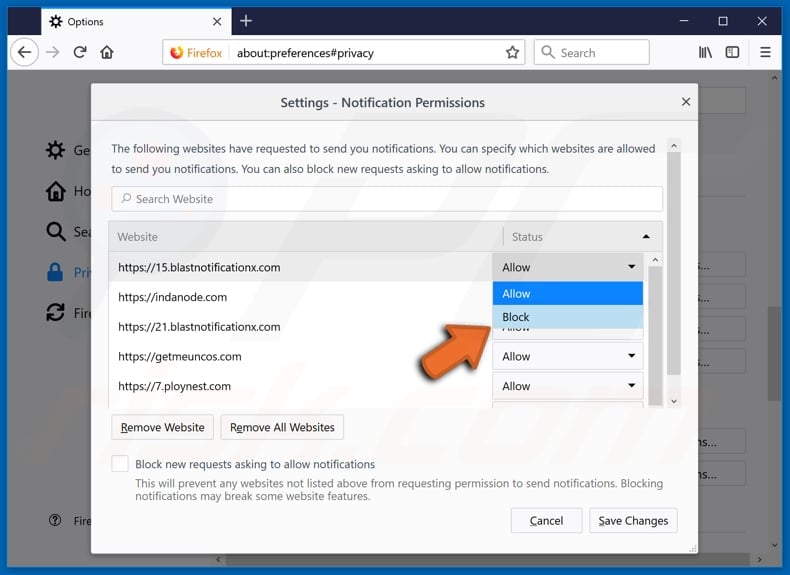
Internet Explorer:
- Click the Gear button on the right upper corner of the IE window
- Select "Internet options"
- Select the "Privacy" tab and click "Settings" under "Pop-up Blocker" section
- Select suspicious URLs under and remove them one by one by clicking the "Remove" button
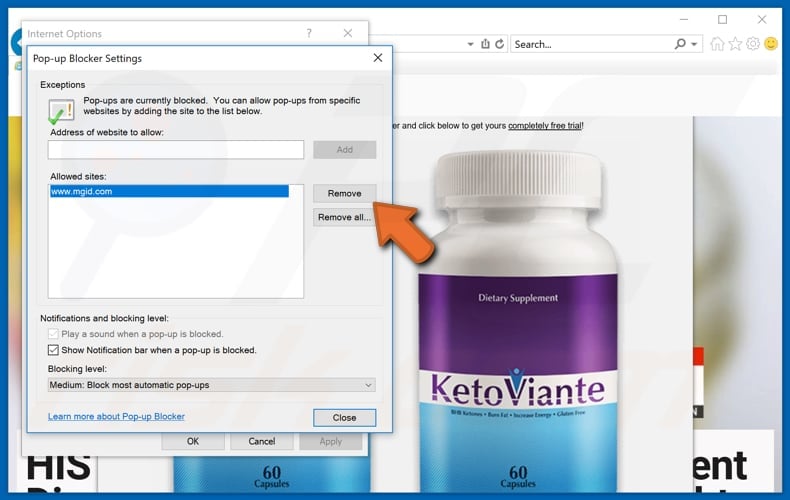
Microsoft Edge:
- Click the menu button (three dots) on the right upper corner of the Edge window
- Scroll down, find and click "Settings"
- Scroll down again and click "View advanced settings"
- Click "Manage" under "Website permissions"
- Click the switch under each suspicious website
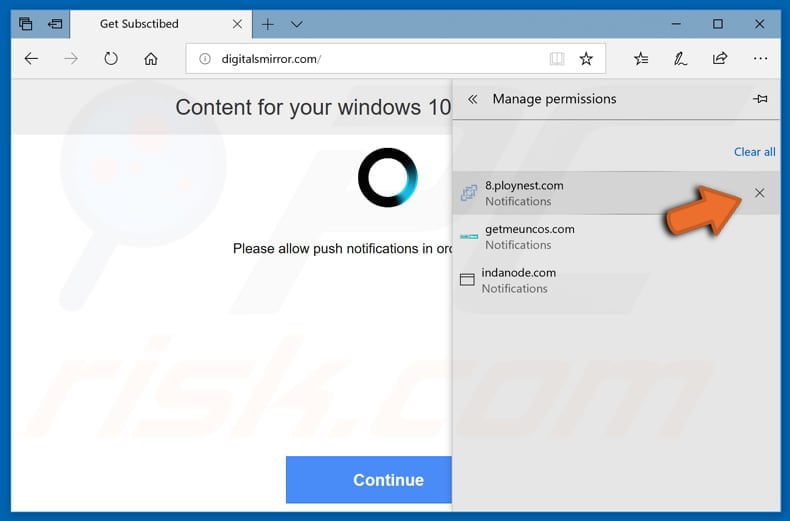
Safari (Mac):
- Click "Safari" button on the left upper corner of the screen and select "Preferences..."
- Select the "Websites" tab and then select "Notifications" section on the left pane
- Check for suspicious URLs and apply the "Deny" option for each
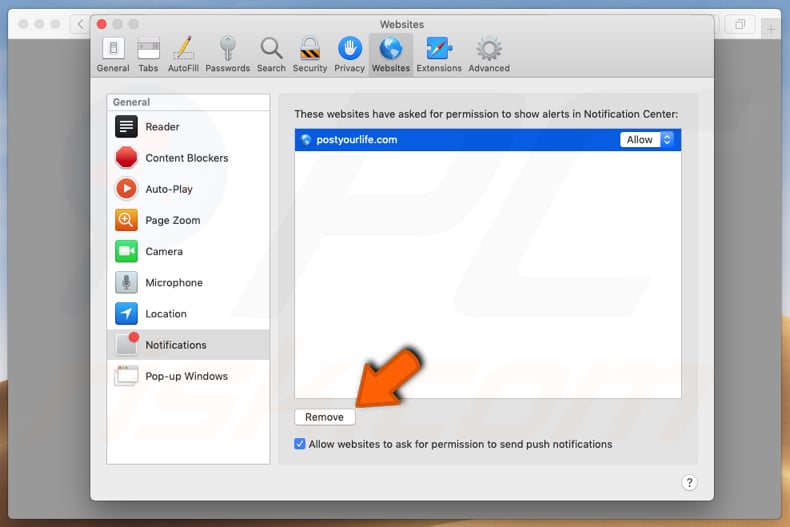
Instant automatic malware removal:
Manual threat removal might be a lengthy and complicated process that requires advanced IT skills. Combo Cleaner is a professional automatic malware removal tool that is recommended to get rid of malware. Download it by clicking the button below:
DOWNLOAD Combo CleanerBy downloading any software listed on this website you agree to our Privacy Policy and Terms of Use. To use full-featured product, you have to purchase a license for Combo Cleaner. 7 days free trial available. Combo Cleaner is owned and operated by RCS LT, the parent company of PCRisk.com.
Quick menu:
- What is Get the new iPhone 11 Pro pop-up?
- How to identify a pop-up scam?
- How do pop-up scams work?
- How to remove fake pop-ups?
- How to prevent fake pop-ups?
- What to do if you fell for a pop-up scam?
How to identify a pop-up scam?
Pop-up windows with various fake messages are a common type of lures cybercriminals use. They collect sensitive personal data, trick Internet users into calling fake tech support numbers, subscribe to useless online services, invest in shady cryptocurrency schemes, etc.
While in the majority of cases these pop-ups don't infect users' devices with malware, they can cause direct monetary loss or could result in identity theft.
Cybercriminals strive to create their rogue pop-up windows to look trustworthy, however, scams typically have the following characteristics:
- Spelling mistakes and non-professional images - Closely inspect the information displayed in a pop-up. Spelling mistakes and unprofessional images could be a sign of a scam.
- Sense of urgency - Countdown timer with a couple of minutes on it, asking you to enter your personal information or subscribe to some online service.
- Statements that you won something - If you haven't participated in a lottery, online competition, etc., and you see a pop-up window stating that you won.
- Computer or mobile device scan - A pop-up window that scans your device and informs of detected issues - is undoubtedly a scam; webpages cannot perform such actions.
- Exclusivity - Pop-up windows stating that only you are given secret access to a financial scheme that can quickly make you rich.
Example of a pop-up scam:

How do pop-up scams work?
Cybercriminals and deceptive marketers usually use various advertising networks, search engine poisoning techniques, and shady websites to generate traffic to their pop-ups. Users land on their online lures after clicking on fake download buttons, using a torrent website, or simply clicking on an Internet search engine result.
Based on users' location and device information, they are presented with a scam pop-up. Lures presented in such pop-ups range from get-rich-quick schemes to fake virus scans.
How to remove fake pop-ups?
In most cases, pop-up scams do not infect users' devices with malware. If you encountered a scam pop-up, simply closing it should be enough. In some cases scam, pop-ups may be hard to close; in such cases - close your Internet browser and restart it.
In extremely rare cases, you might need to reset your Internet browser. For this, use our instructions explaining how to reset Internet browser settings.
How to prevent fake pop-ups?
To prevent seeing pop-up scams, you should visit only reputable websites. Torrent, Crack, free online movie streaming, YouTube video download, and other websites of similar reputation commonly redirect Internet users to pop-up scams.
To minimize the risk of encountering pop-up scams, you should keep your Internet browsers up-to-date and use reputable anti-malware application. For this purpose, we recommend Combo Cleaner Antivirus for Windows.
What to do if you fell for a pop-up scam?
This depends on the type of scam that you fell for. Most commonly, pop-up scams try to trick users into sending money, giving away personal information, or giving access to one's device.
- If you sent money to scammers: You should contact your financial institution and explain that you were scammed. If informed promptly, there's a chance to get your money back.
- If you gave away your personal information: You should change your passwords and enable two-factor authentication in all online services that you use. Visit Federal Trade Commission to report identity theft and get personalized recovery steps.
- If you let scammers connect to your device: You should scan your computer with reputable anti-malware (we recommend Combo Cleaner Antivirus for Windows) - cyber criminals could have planted trojans, keyloggers, and other malware, don't use your computer until removing possible threats.
- Help other Internet users: report Internet scams to Federal Trade Commission.
Share:

Tomas Meskauskas
Expert security researcher, professional malware analyst
I am passionate about computer security and technology. I have an experience of over 10 years working in various companies related to computer technical issue solving and Internet security. I have been working as an author and editor for pcrisk.com since 2010. Follow me on Twitter and LinkedIn to stay informed about the latest online security threats.
PCrisk security portal is brought by a company RCS LT.
Joined forces of security researchers help educate computer users about the latest online security threats. More information about the company RCS LT.
Our malware removal guides are free. However, if you want to support us you can send us a donation.
DonatePCrisk security portal is brought by a company RCS LT.
Joined forces of security researchers help educate computer users about the latest online security threats. More information about the company RCS LT.
Our malware removal guides are free. However, if you want to support us you can send us a donation.
Donate
▼ Show Discussion